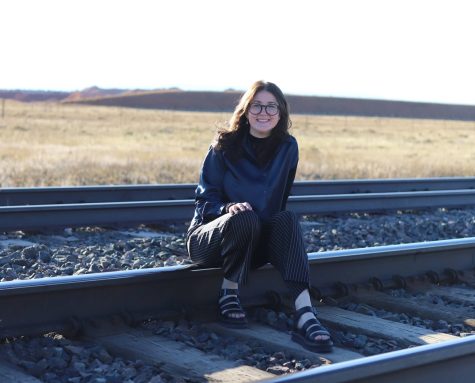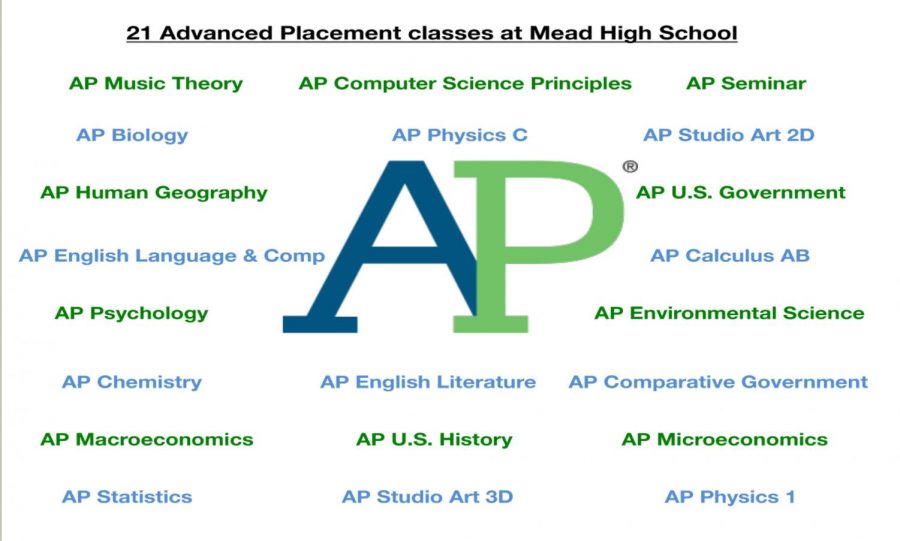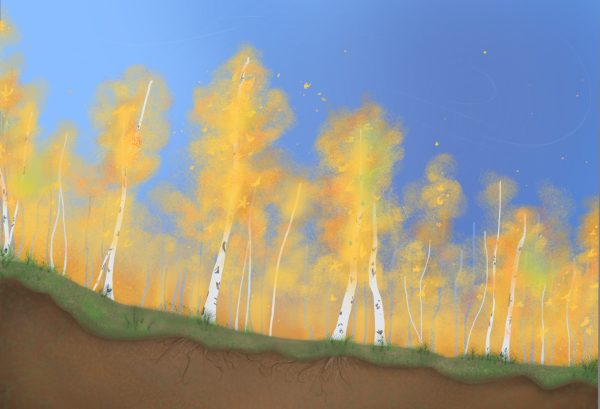Which AP class is right for you?
Look into some of the AP courses here at Mead High including AP Psychology, Statistics, Comparative Government, Studio Art, Literature, Music Theory, Biology, and Computer Science Principles.
MHS offers 21 AP courses and exam opportunities.
If you’ve been thinking to yourself, “Should I take an AP class?” or “What AP class would I enjoy?”, you’ve come to the right place.
Mead High School offers 21 AP (Advanced Placement) classes in a wide range of topics. We have AP Studio Art classes, Psychology, and Computer Science Principles. We also have AP Government, Literature, and Environmental Science.
Unfortunately, I can’t do a section on every single one of these classes, or my article would be 20 pages long! But I will provide a list of available AP classes. If you see one you are interested in, your counselor is a great person to talk to about that.
Here are all currently available AP classes at MHS:
AP Human Geography
AP Physics
AP Biology
AP Seminar
AP Psychology
AP Calculus
AP Statistics
AP Spanish
AP Environmental Science
AP Comparative Government
AP Literature
AP Research
AP Chemistry
AP Language
AP US Government
AP US History
AP European History
AP Music Theory
AP Studio Art 2D/3D
AP Macroeconomics
AP Computer Science Principles
Out of all these classes, I have selected eight from a wide variety of subjects.
The first is AP Psychology. This is taught by Ms. Rachel Sandoval in D217.
“[AP Psychology is] the study of behavior and mental processes,” Sandoval said.
This course is quite large and is considered full after about 120 students have signed up. Those students are then split into three different sections.
“[We] try to accommodate everyone that signs up,” she said.
You can take AP Psychology as a sophomore, junior, or senior, but Sandoval advises taking the class as a junior or senior.
“The reason AP Psych is so cool is because it’s so intuitive and it’s… really interesting to learn about yourself and the people around you.”
Psychology will most likely be offered during three blocks next year as it has been for many years before. Sandoval suggests this class for anyone who is comfortable with a faster pace and has taken honors and AP classes before. It is also best for those who can read a little faster and can read college level texts comfortably.
There are anywhere between 10-15 pages of reading every night with any additional homework from that class period. Homework from AP Psychology usually ends up being 30-60 minutes per class. Oftentimes, there is also a crash course video to go with the reading.
About 66% of AP Psychology students pass the AP exam at the end of the course.
“AP Psych is one of the most successful [AP] tests in the country.”
Sandoval’s favorite part of teaching this class is how relatable and connected it is to daily life.
She said, “Psychology and the concepts we learn about are all over all the time.”
AP Comparative Government is a semester long AP course taught by Mr. Steve Parsons in D214.
“We compare six different countries. We compare the United Kingdom, Mexico, Iran, Russia, China, and Nigeria,” Parsons said. He continued by explaining, “We compare their cultures and their history and their governments.”
Though Parsons has never reached full capacity in his class, he generally gets about 20-25 students each year and can hold up to 30 in his classroom.
To take AP Comparative Government, you have to have previously taken U.S. History.
The majority of homework given is reading and “shouldn’t take anyone more than an hour” per class or 30 minutes per day. Throughout the entire class, students are also preparing for the AP exam. Last year, roughly 66% of students passed the AP exam with a three or higher.
Skills that are most beneficial to a student in AP Comparative Government include “good study skills” and “time management”. When you’re able to “stay on top of everything”, this class will be a lot easier and a lot more enjoyable. Parsons also mentions how beneficial memorization skills are.
“We’re learning [about] six different countries, and each of them as a different government structure,” he said.
Parsons loves to learn about “a diversity… of cultures” and to have conversations with his students.
If you enjoy going into depth in regards to musical background, AP Music Theory is the class for you. This class is taught in B132 by Ms. Katarina Schmitt.
“There are three main components to [AP Music] Theory… there’s the written aspect, there’s the ear training aspect… [and] there’s also a singing component,” Schmitt said.
She isn’t aware of the exact percentage rate of students that pass the AP exam, but all students seem to enjoy taking this course and learning more about their passion.
“I think it’s really fun to get a variety of music students who are all… especially interested in music [in a class] together,” she said.
AP Music Theory is considered full after about 16 students have signed up.
This class generally has about 30 minutes of homework assigned after every meeting.
“I generally assign… a short worksheet and/or some questions from AP Classroom, and then the other component is studying and keeping up with ear training skills,” Schmitt said. “Consistency is more important than [amount].”
To take this class, you must have, as stated by the Mead High School Course Descriptions, “musical background and strong desire to learn”.
“There’s some basic knowledge going in[to AP Music Theory],” Schmitt said.
Valuable skills to have in AP Music Theory generally include being able to comfortably read music and a background in relation to singing. Of course, basic knowledge in singing isn’t necessary to take this course, it’s simply a way to direct a student towards success.
Some students are more intrigued by technology and complicated computer work as opposed to musical concepts. If this is the case, you may want to check out AP Computer Science Principles. This is a year long AP class taught by Mr. Jeremie Palko in C202.
AP Computer Science Principles teaches students “how computers work, how data is sent between devices, how the internet works and… a lot of python programming [during]… second semester”.
When asked how much homework should be expected every night, Palko answered, “Little to none if you do everything in class.”
There are no prerequisites or requirements for this course, and any grade level can take it at any time. When in AP Computer Science Principles, it is extremely helpful to have “basic technology skills” and “a little bit of programming experience”. Programming background isn’t necessary for success, but it can be helpful.
Since this is an AP course, it does include an AP exam at the end. If passed, this exam gives you varying levels of college credit. Palko isn’t positive on how many students pass this exam.
He loves to teach this class because of how “hands-on” it is. He enjoys letting his students “explore and learn new things” in AP Computer Science Principles.
Once this class has 30 students, it is considered full and will not accept any more. However, there is always room next year.
Another incredible AP class is AP Literature, taught by Ms. Kelly Corne in D232.
In AP Literature, they study fictional texts “from [the] Shakespearean era to the present” and “poetry”. Very rarely do they look at nonfiction texts. According to Corne, AP Literature is “looking at the ways that authors develop ideas through different literary techniques”.
Mead High tries to keep this course at 25 students or lower with two classes per year. However, Corne said, “If more students signed up, they would probably just make more sections.”
Corne suggests you take Honors or AP English Language before taking AP Literature, but it isn’t an official requirement. You must be a senior to take this course.
Homework is usually pretty consistent and is on a higher level in regards to amount and difficulty. “Probably one to two hours [of homework] per class period,” Corne said. That is usually longer if the student is writing a paper or doing a project.
When asked the more beneficial skills for a student to have in the class, Corne said,“The biggest thing that makes a student successful is their willingness to commit to the work. If you read the texts, and you’re willing to take a stab at the writing, you’ll be successful.” It’s also helpful when you are “willing to… read… all different types of literature”.
At the end of the course, about 75-80% of students pass the AP test with a three or higher.
“My favorite part about teaching this class is the variety of ideas that you get out of students and the way they see different texts,” Corne said.
She continued, “[The outcomes] are all so unique based on the same text. It just really shows the power of literature and the way that it can spark different things in each one of us.”
AP Biology is a course taught by Mr. Michael Ward in G115. This class requires you to have previously completed Biology as a freshman and Chemistry as a sophomore.
“To better understand AP Bio I would [suggest]… Honors Bio[logy] and Honors Chem[istry],” Ward said.
The most beneficial skills for a student to have in this course include being able to “be self driven” and “willing to be pushed”.
Ward said, “If you can overcome those things, you will be very successful.”
Though there is no set number for AP Biology, once about 35 students have signed up, it will most likely be considered full. Ward has never run into that problem though as the science rooms are generally pretty large and can hold quite a few students between the desk in the center and the lab tables around the perimeter of the classroom.
In AP Biology, you will “touch on a little bit of chemistry” and talk about cells, genetics, the ecosystem and ecology, and how organisms interact with one another. About 75% of students pass the AP exam at the end of the school year.
Generally, students spend about 15-45 minutes on homework from AP Biology each night depending on if projects or reports are due. The amount of work tends to vary after every class.
Ward said, “The best part about teaching [AP Biology] is being able to go into… greater detail.” He also mentions loving the “high level laps” that they do in class.
For any junior or senior who has formerly taken Algebra 2 or is currently enrolled in Algebra 2 and has a teacher recommendation, AP Statistics is a great class for you. AP Statistics is an AP course where about 33% of students pass the final exam. Ms. Megan Meyers teaches this class in G207.
When asked how many students can sign up for her class, Meyers said, “There is no limit to the number of students who can sign up for the class.” She continued by explaining that she can hold 35 students in one classroom and many, many more in another. So, truly, as many students as want to can sign up for AP Statistics.
Meyers explains that they learn about “statistical practices”, and the Mead High School Course Description Book elaborates that students “will learn about exploratory analysis, experimental design, probability, and statistical inference”.
She said, “[Statistics] is comparing what it looks like to what, statistically, it actually is.”
According to Meyers, every night, there’s about an hour of homework.
It is extremely helpful for a student to be good at “time management, note taking, attention to detail, and retention” in this class. All of these skills help lead to success.
Meyers closed with saying, simply, “I love statistics.”
If you’re looking to take a college level art class, it may be worth looking into AP Studio Art 2D/3D. AP Studio Art 2D/3D is taught by Ms. Jessica Thomas in E127. This class focuses on artistic “experimentation” and “risk taking”. Once 32 students have signed up, AP Studio Art 2D/3D is considered full until the next school year.
“For AP [Studio Art], there’s a drawing portfolio, 2D and 3D, and they’re all in the same class,” Thomas said.
The amount of homework that is completed every night varies. She explains that “it kind of depends on what you’re doing” and that “some projects go faster than others”.
To take AP Studio Art 2D/3D, a student must have previously completed at least one advanced course and have teacher approval.
Even though this is an AP course, there is not a formal AP exam at the close of the school year. Instead of having an exam, AP Studio Art has their students create a portfolio of 15 pieces based on a theme of their choice. That portfolio is then scored on a rating of one to six, the six simply being for the “art community”. In the past three years, five people have received a five on their portfolio, eleven people have received a four, and eight people have received a three. There has only been one scoring under a three.
To be successful in this course, Thomas highly suggests a student be “self disciplined” and have “a strong confidence in their art abilities”. It is also helpful if a student is willing to take artistic “risks” and has “a certain level of maturity”.
Thomas said, “I love to see what [my students] come up with [and the] ideas that they’re really passionate about that they… follow through with.”
Thomas is always willing to support and encourage her students with their art. She loves to watch her students push themselves and grow.
If you have any questions about any of the courses listed or showcased above, talk with your counselor. Counselors are prepared to help their students decide which classes will work best for them next year.
The MHS Course Description Book is also a wonderful resource to check out if you’re needing more information about a specific class.
I highly recommend anyone interested in any of these topics to talk with their counselor and challenge themselves for the 2020-2021 school year.
I wish you all luck with building your schedule and looking at possible AP classes for next year!
Your donation will support the student journalists of Mead High School. Your contribution will allow us to purchase equipment and cover our annual website hosting costs.

Arizona Lee is a senior, and this is her second year as Editor-in-Chief of The Mav. She enjoys reading, listening to good music, and spending time with friends. She hopes to guide the student newspaper and broadcast this year to continued success.






